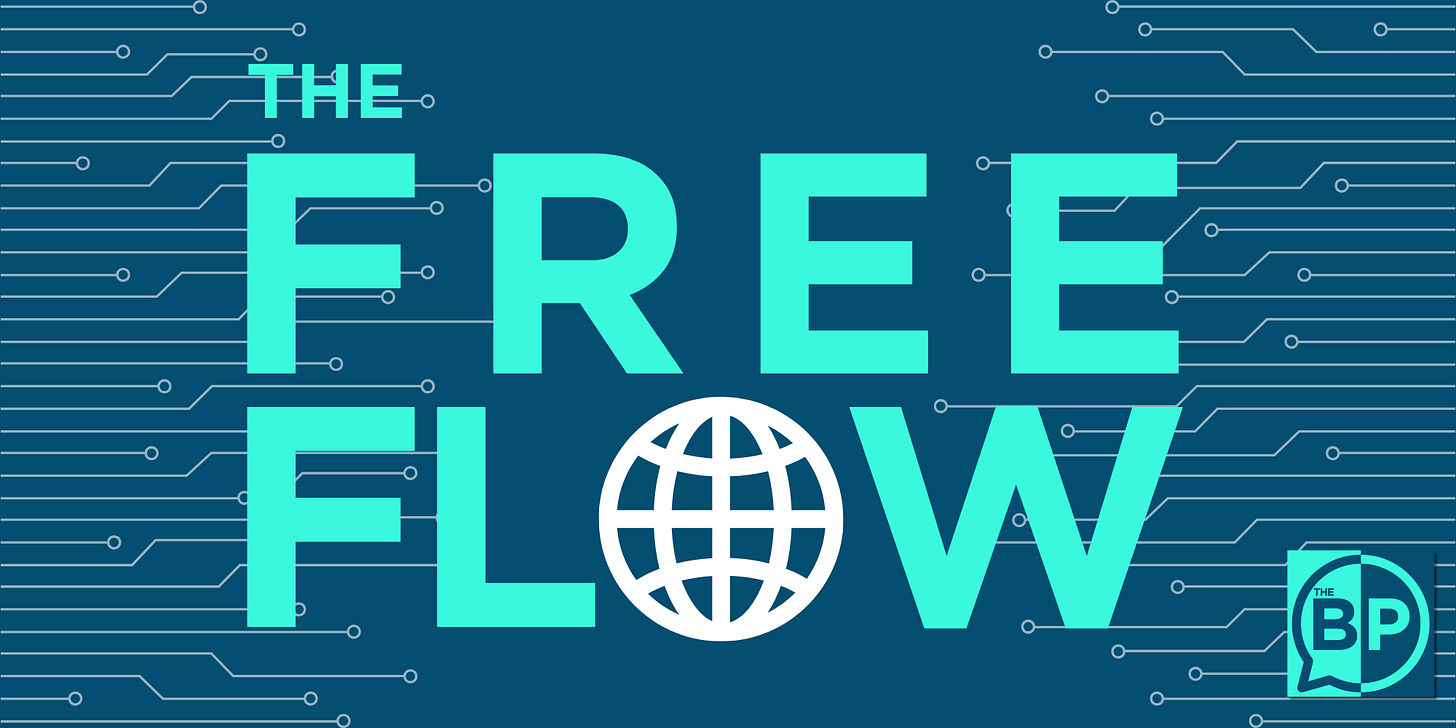The Free Flow — May 22, 2025
FTC probes social media moderation, Romania cracks down on election speech, TikTok faces EU charges under the DSA, a VOA journalist is jailed in Azerbaijan, and more.
First of All
» FTC’s Content Moderation Probe Threatens First Amendment
The Federal Trade Commission, under Chairman Andrew Ferguson, is looking into social media platforms for “potentially illegal” content moderation practices.
Details:
Launched in February, the probe seeks public input on whether platforms violate user rights through inconsistent or deceptive enforcement of their moderation policies.
Ferguson frames the investigation as a fight against “Big Tech censorship,” particularly against conservatives.
FoFS Senior Legal Fellow Ashkhen Kazaryan warns that the FTC is attempting to act as an unconstitutional speech regulator, substituting government judgment for platforms’ editorial discretion — a function the Supreme Court has repeatedly protected.
Read our public comment submitted to the FTC here.
» Trump Calls for Investigation Into Celebrity Speech
President Trump demanded a “major investigation” into Bruce Springsteen, Beyoncé, Oprah Winfrey, and Bono for allegedly receiving unlawful payments for endorsing Kamala Harris during her 2024 campaign.
Details: Although he provided no evidence, Trump claimed these endorsements constituted “illegal campaign contributions.”
» DOJ Vows To ‘Shame’ Individuals Not Charged with Crimes
Ed Martin, recently appointed by President Trump to lead the Justice Department’s Weaponization Working Group, said he plans to publicly “name and shame” individuals who investigated Trump and his allies, even if they face no formal charges.
Details:
Martin said prosecutors who worked on the Trump Organization case, Jan. 6 prosecutions, and abortion-related charges could be named in the coming months.
“If they can’t be charged, we will name them,” he said. “And in a culture that respects shame, they should be people who are ashamed.”
DOJ protocol historically discourages revealing non-public information about investigations of uncharged individuals.
» Former FBI Director Investigated for Ambiguous Instagram Post
Former FBI Director James Comey was interviewed by the Secret Service after posting a photo of seashells arranged as “86 47” on Instagram, interpreted by the Trump administration as a coded call for violence against President Trump, the 47th U.S. President.
Context: Comey and Trump have a long history of animosity dating back to Comey’s 2017 firing. Trump called the post a “terrible thing and labeled Comey a “dirty cop.”
Response: Comey deleted the image and later said he didn’t realize the numbers could be read as threatening. “I oppose violence of any kind,” he wrote in a follow-up post.
» Trump Signs the TAKE IT DOWN Act
President Trump signed the TAKE IT DOWN Act on May 19, which mandates websites and social media platforms take down all forms of nonconsensual “intimate imagery,” including AI-generated deepfakes, within 48 hours, or risk hefty fines and prison sentences.
Background: The TAKE IT DOWN Act marks the first federal legislation to regulate NCII, but it poses serious risks to Americans’ free speech due to its lack of guardrails, overbreadth, and ambiguity.
You can read more about how the TAKE IT DOWN Act could be used to censor constitutionally protected speech here.
Digital Age
» Romanian Election Sparks Censorship Claims
Romania’s special presidential election has triggered a firestorm of free speech and foreign interference concerns, with hard-right candidate George Simion pledging to contest the results and accusing France and Romania of censorship.
Romania Emergency Rules Censor Right-Wing Content:
The Romanian government passed emergency rules in January after annulling the previous presidential election due to concerns over Russian disinformation. These rules have drawn sharp criticism for disproportionately suppressing content in supporting Simion.
The measures allow the government to demand that online content be taken down within five hours, and fines exceed half the average Romanian annual salary.
Since April 4, more than 4,000 takedown orders, mainly targeting TikTok, have been issued. One takedown included a man clapping to pop music with a caption referencing Simion and disqualified candidate Cǎlin Georgescu, despite having just 148 followers.
French Jawboning Allegations via Telegram:
Telegram founder Pavel Durov alleged that French intelligence demanded the removal of several conservative Romanian channels on the platform ahead of the vote, citing concerns about “foreign influence.”
Durov is currently under judicial supervision in France, after being charged with complicity in organized crime on Telegram.
French authorities denied making the request, stating that while they had spoken to Durov many times, it was "to firmly remind him of his company's responsibilities, and his own personally, in preventing terrorist and child pornography threats."
» Court Rules California Official Violated First Amendment by Blocking Facebook Critics
The Ninth Circuit Court of Appeals ruled on May 14 that a California school board member violated the First Amendment when she blocked two parents from commenting on her social media pages, which she used to communicate official matters.
Details:
Michelle O’Connor-Ratcliff, a Poway Unified School District board member, deleted or hid critical comments from Christopher and Kimberly Garnier and later blocked them entirely.
Her Facebook and X (formerly Twitter) pages were “almost exclusively” used to share information about school board activities, and were “designated as official in both appearance and function.”
This case reinforces the recent Supreme Court rulings that public officials cannot block individuals from engaging with official communications on social media, even if the content is critical.
» KOSA’s Return Renews Fear Over Online Censorship
The Kids Online Safety Act has been reintroduced in the Senate after a failed effort to become law late last year. The bill has reignited concerns that its broadly defined “duty of care” for online platforms may suppress protected speech and stifle innovation.
Details:
Aimed at shielding minors from psychological harms like “anxiety,” “depression,” and “compulsive usage,” the bill requires platforms to proactively prevent content that could foreseeably lead to such outcomes.
Vague standards of “reasonable care” and “any design” risk granting the federal government sweeping authority over platform operations.
» Missouri AG Pushes Content Moderation Rule
Missouri Attorney General Andrew Bailey has introduced a first-of-its-kind rule requiring social media companies to let users choose their own third-party content moderators, a move he claims is backed by the Supreme Court’s decision in Moody v. NetChoice.
Details:
Bailey’s regulation, filed under Missouri’s consumer protection law, mandates that platforms offer users a moderation “choice screen” and allow interoperability with external moderation services.
Legal experts push back, arguing the Supreme Court explicitly reaffirmed that platforms’ content moderation is protected by the First Amendment, likening it to editorial discretion in newspapers, in Moody.
» VPN Removals Mark Escalation in Russian Crackdown on Digital Privacy
Between May 15 and 16, multiple VPN apps were purged from app stores in Russia at the request of Roskomnadzor, the country’s internet regulator.
Samsung, Xiaomi, and Huawei followed earlier removals by Apple and Google, further restricting Russians’ access to privacy tools.
Details:
The app removals coincide with the enforcement of a 2024 Russian law criminalizing the distribution of information about circumventing internet censorship.
Nearly 100 VPN apps have now been removed from Apple’s Russian App Store since July 2024, eliminating crucial tools for Russians to access censored news, bypass restrictions, and maintain privacy under expanding surveillance controls.
» Henan Builds Regional Firewall, Expanding China’s Censorship Model
New research from the Great Firewall Report reveals that Henan province has developed a region-specific censorship system that blocks far more content than China’s national-level Great Firewall.
Context:
The research documents that the firewall disproportionately focuses on business and economic websites, potentially as a response to local financial scandals, including a 2022 banking crisis that triggered mass protests in Henan.
The case represents a shift from centralized censorship to local enforcement, complicating efforts to track and circumvent Chinese internet restrictions.
Since August 2023, users in Henan have experienced access restrictions to tens of thousands of websites that remain available elsewhere in China.
The Brussels Effect: Europe and Beyond
» EU Charges TikTok Under DSA
In its preliminary findings released May 15, the European Commission said TikTok has violated EU transparency rules under the Digital Services Act.
The platform is the second major social media company, after X, to face formal warnings under the landmark legislation.
Details:
The Commission found that TikTok failed to provide required information about ad content, targeting practices, and sponsorship, and did not make its ad library searchable to the public.
TikTok could face a fine of up to 6% of its global revenue. The company stated it supports the DSA’s goals, but criticized the lack of clear public guidelines and expressed disagreement with parts of the Commission’s interpretation.
Ongoing Investigation:
The platform remains under additional DSA scrutiny for its algorithmic design, protections for minors, and transparency to researchers.
A separate probe is also examining TikTok and potential manipulation or disinformation affecting Romania’s disputed 2024–2025 election cycle.
Jordi Calvet-Bademunt and Joan Barata recently wrote about the potential consequences of DSA enforcement for freedom of expression.
» Trump Administration Criticizes EU Digital Laws
The Trump administration is escalating a campaign against the European Union’s Digital Services Act, portraying the regulation as a transnational censorship tool that threatens American free speech and tech autonomy.
Details:
As reported in a previous Free Flow, JD Vance’s criticism of EU censorship at the Munich Security Conference reflects the administration's broader concerns (although Jacob Mchangama recently pointed out that this criticism was hypocritical).
Since then, Internal State Department memos have shown that U.S. embassies were asked to gather examples of the EU government's efforts to limit speech, and trade and commerce departments have been instructed to explore retaliatory measures.
Administration officials warn the DSA’s standards for content moderation could extend beyond EU borders, threatening First Amendment protections through backdoor pressure on U.S.-based companies.
» European News Editors Condemn Hungary’s Proposed Law Targeting NGOs
More than 80 editors from major European news organizations have signed a petition urging Hungary to drop a new bill that would empower the government to blacklist and potentially shut down organizations receiving foreign financial support.
The law would allow the newly created Sovereignty Protection Authority to label media outlets and NGOs as threats to “national sovereignty” for promoting content not aligned with the government’s conservative agenda, as detailed in our last Free Flow.
» France Urges Tighter EU Grant Controls Over Extremism-Funding Concerns
France has called on the European Commission to strengthen oversight of EU funding in light of rising hate speech and concerns that some recipients may be linked to antisemitism or Islamist extremism.
Details:
European Minister Benjamin Haddad said it is “unthinkable” that EU funds should support actors “hostile to our values,” and announced plans to table a proposal at the May 27 General Affairs Council.
The proposal includes suspending funding for recipients who violate EU treaty values, stricter vetting of grant applications, and oversight mechanisms for programs like Erasmus+.
The move follows backlash over a 2021 European Commission-funded campaign from the Council of Europe featuring the slogan “freedom is in hijab,” which drew sharp criticism in France for clashing with its constitutional principle of secularism.
» Gary Lineker Faces Potential Hate Speech Probe Over Instagram Post
British broadcaster and former footballer Gary Lineker may be subject to a police investigation over an Instagram story that included a rat emoji, which complainants allege carried antisemitic connotations.
Background:
The post, shared on May 12, featured a pro-Palestinian video and an emoji that has historically been used in antisemitic propaganda.
Lineker deleted the post and issued two apologies, stating he was unaware of the symbol's offensive history and “would never consciously repost anything antisemitic.”
The London Metropolitan Police received multiple reports and visited at least one complainant, though no formal investigation has been opened. Officers may be considering categorizing the incident as a non-crime hate incident (NCHI).
The case again raises concerns over the UK's ambiguous “hate incident” framework, where speech that causes perceived offense may be recorded—even if no crime has occurred.
» Irish Rapper Faces Terror Charge for Alleged Hezbollah Flag Display
UK prosecutors have charged Liam Óg Ó hAnnaidh, a member of the Irish-language hip-hop group Kneecap, with a terrorism offense after video footage surfaced showing him allegedly displaying a Hezbollah flag during a London performance.
Background:
The Metropolitan Police launched an investigation after receiving footage of Kneecap’s November 2024 gig at the O2 Forum.
Ó hAnnaidh, known by his stage name Mo Chara, is scheduled to appear at Westminster Magistrates’ Court in June.
Hezbollah is a proscribed terrorist organization in the UK, and expressing support for it is a criminal offense under British law.
Kneecap denied the allegations, calling the charge “political policing” and arguing the video has been taken out of context.
The group has faced a string of cancellations and lost its U.S. visa sponsor after separate controversies over its Gaza-related messages at Coachella.
» Denmark Makes First Conviction Under Quran Law
A Danish court convicted Rasmus Paludan and an associate for the “improper treatment” of the Quran, marking the first criminal case under Denmark’s controversial 2023 law banning desecration of religious texts.
Background:
The Quran law, passed in December 2023, criminalizes the improper treatment of religious scriptures, including the Bible, Torah, and Vedas, in response to international backlash over Quran burnings.
Prosecutors acknowledged the law limits freedom of expression but argued it does not affect spoken or written content, only symbolic acts.:
The incident took place during a public event on June 15, 2024, where the pair tore pages from an English-language Quran and let the book fall into a puddle during what they claimed was an “artistic performance.”
Ruling and Sentencing:
The court rejected their artistic defense, ruling that any expressive intent was constructed merely to mask the violation of the law.
Both were fined 10,000 kroner (approx. €1,340) each, in line with the prosecution’s request.
Press Freedom
VOA Journalist Jailed in Azerbaijan: Ulviyya Ali, an Azerbaijani journalist who reported for the U.S. government-funded Voice of America, was arrested on May 8 in Baku and charged with currency smuggling, an accusation frequently used to silence reporters in the country.
Russia Detains Book Publishers in Anti-LGBTI Crackdown: At least 10 publishing professionals were detained in Moscow on May 14 over “extremism”-related charges linked to the publication and distribution of LGBTI-themed books.
Iowa Governor Signs Anti-SLAPP Law: Iowa Governor Kim Reynolds signed House File 472 into law on May 19. This law enables defendants in SLAPP cases to file a special motion for expedited dismissal within 60 days and requires a court hearing within another 60 days unless delayed for good cause.
Protest Watch
Campus Censorship Targets Gaza War Protests: A new report from the Foundation for Individual Rights and Expression reveals that from 2023-24, U.S. colleges most frequently censored student speech related to protests against Israel’s war in Gaza, marking a stark shift from earlier years when sanctions disproportionately targeted conservative speech on race and gender.
Ben & Jerry’s Co-Founder Arrested During Capitol Hill Protest: Ben Cohen, co-founder of Ben & Jerry’s, was one of seven individuals arrested on May 14 for disrupting a Senate hearing during testimony by U.S. Health Secretary Robert F. Kennedy Jr.. Capitol Police charged Cohen with “crowding, obstructing, or incommoding,” a common charge for nonviolent civil disobedience. Cohen was protesting the U.S. government’s military support for Israel’s war in Gaza and domestic policy decisions.
Azerbaijan Upholds Prison Sentence Against Opposition Figure: A Baku appeals court has upheld the nine-year sentence handed to Tofig Yagublu, a long-time opposition leader and member of the Musavat Party and the National Council of Democratic Forces, despite widespread concerns over the fairness of his trial.
El Salvador Passes Foreign Agents Law Targeting NGOs: El Salvador’s Congress passed a controversial law on May 20, imposing a 30% tax on foreign donations to NGOs, as part of a broader crackdown on public discourse. The law directly targets civil society organizations that receive international funding. Sixteen transport workers were arrested at a peaceful protest by over 300 families in Santa Tecla, where the Military Police were deployed in an unprecedented move to silence dissent.
Quick Hits
UK Woman Jailed for Tweet Denied Sentence Appeal: Lucy Connolly, a former childminder and wife of an ex-Tory councillor, lost her appeal against a 31-month prison sentence for inciting racial hatred after posting a tweet calling for hotels hosting asylum seeker to be set on fire. Recent reporting highlighted inconsistencies in sentencing and the perceived politicization of Connolly’s prosecution.
Cameroon Sentences Peace Activist for Life: Cameroon’s military court has sentenced Anglophone peace activist Abdu Karim Ali to life imprisonment for “hostility against the homeland” and “secession.” Ali was arrested in 2022 after denouncing a pro-government militia leader’s acts of torture in an online video and has since been held in arbitrary detention.
Indian Scholar Arrested Over Anti-War Posts: Prominent academic Ali Khan Mahmudabad, head of political science at Ashoka University, was arrested Sunday after posting criticism of India’s military conflict with Pakistan and the ruling Bharatiya Janata Party (BJP). Mahmudabad called the war “brutal” and criticized the BJP’s role in promoting communal violence.
Oregon Senate Passes Ban on Nonconsensual AI-Generated Deepfake Porn: The Oregon Senate has unanimously approved House Bill 2299, closing a legal loophole that excluded AI-generated “deepfake” pornography from existing revenge porn statutes. The bill prohibits sharing nonconsensual sexually explicit synthetic media.
Denmark Bans Palestine As A Topic From National Youth Mock Election: The Danish Parliament has banned “Recognise Palestine as an independent state” as a campaign topic in next year’s national mock election for schoolchildren, citing the issue’s complexity and potential to divide classrooms. The mock elections are held in Danish schools to teach 8th- to 10th-grade students about democracy and political participation. Critics call the move a restriction on youth political engagement and free speech.
Apple Fined Over $130,000 in Russia for Alleged “LGBT propaganda”: On May 16, Moscow’s Tagansky District Court fined Apple a total of 7.5 million roubles across three cases for allegedly distributing “LGBT propaganda.” An additional 3 million roubles was levied in a separate case for failure to delete content flagged by Russia’s censorship agency.
Artists Accuse Whitney Museum of Censorship: The Whitney Museum of American Art has been criticized for cancelling a performance by three artists in its Independent Study Program that addressed the humanitarian crisis in Gaza. The work was pulled two days before its scheduled May 14 presentation, and the artists allege the cancellation was due to political content deemed “exclusionary and inflammatory.”
Ashley Haek is the Communications Coordinator at The Future of Free Speech.
Justin Hayes is the Director of Communications at The Future of Free Speech and the Managing Editor of The Bedrock Principle.







